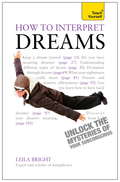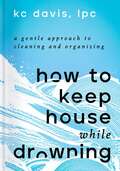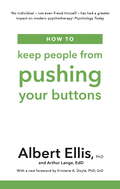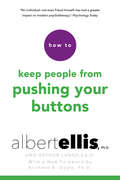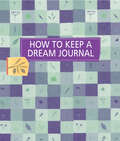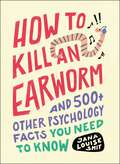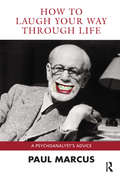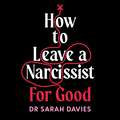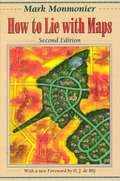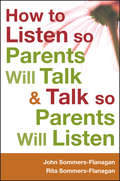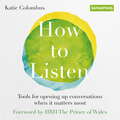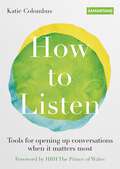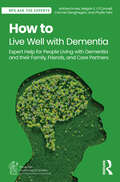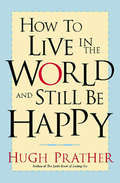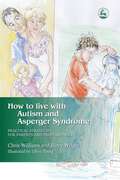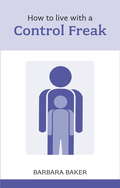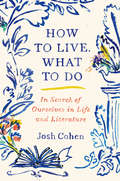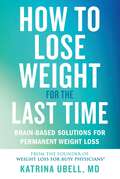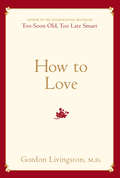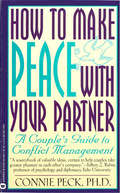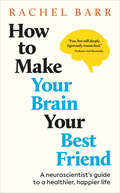- Table View
- List View
How to Interpret Dreams: Teach Yourself
by Leila BrightWhat do our dreams mean? Throughout recorded history this question has fascinated people all over the world. How to Interpret Dreams is a complete handbook - simple, practical and easy to use - which suggests a host of possible answers. Dreams can serve as guides to your inner self and to your relationships, health and career success.How to Interpret Dreams explains how you can benefit from the power of dreams by:- Recalling dreams vividly and distinguishing significant from insignificant dreams.- Learning to work with symbols to gain insight into the messages hidden in dreams.- Appreciating the role played by specific types of dream - prophetic, anxiety, sexual etc.- Harnessing the power of lucid and mutual dreaming.- Learning to generate dreams to help solve specific problems.It includes case studies and sample entries from dream diaries as well as a comprehensive, quick-reference A to Z of the meaning of symbols - from abyss to zoo, fog to sunshine and bereavement to birth, plus hundreds of others in between.
How to Keep House While Drowning: A Gentle Approach to Cleaning and Organizing
by KC DavisKC Davis offers a compassionate approach to cleaning and organizing, helping you transform your home without guilt. A perfect Mother&’s Day gift for moms seeking peace and practical solutions.If you&’re struggling to stay on top of your to-do list, you probably have a good reason: anxiety, fatigue, depression, ADHD, or lack of support. For therapist KC Davis, the birth of her second child triggered a stress-mess cycle. The more behind she felt, the less motivated she was to start. She didn&’t fold a single piece of laundry for seven months. One life-changing realization restored her sanity—and the functionality of her home: You don&’t work for your home; your home works for you. In other words, messiness is not a moral failing. A new sense of calm washed over her as she let go of the shame-based messaging that interpreted a pile of dirty laundry as &“I can never keep up&” and a chaotic kitchen as &“I&’m a bad mother.&” Instead, she looked at unwashed clothes and thought, &“I am alive,&” and at stacks of dishes and thought, &“I cooked my family dinner three nights in a row.&” Building on this foundation of self-compassion, KC devised the powerful practical approach that has exploded in popularity through her TikTok account, @domesticblisters. The secret is to simplify your to-do list and to find creative workarounds that accommodate your limited time and energy. In this book, you&’ll learn exactly how to customize your cleaning strategy and rebuild your relationship with your home, including: -How to see chores as kindnesses to your future self, not as a reflection of your worth -How to start by setting priorities -How to stagger tasks so you won&’t procrastinate -How to clean in quick bursts within your existing daily routine -How to use creative shortcuts to transform a room from messy to functional With KC&’s help, your home will feel like a sanctuary again. It will become a place to rest, even when things aren&’t finished. You will move with ease, and peace and calm will edge out guilt, self-criticism, and endless checklists. They have no place here.
How to Keep People From Pushing Your Buttons
by Arthur Lange Albert Ellis PhDLife can get tough. From unemployment-or overwork-to divorce or remarriage, the challenges of newly blended families, not to mention everyday hassles, stress can feel non-stop. To top it off, technology confronts us with a barrage of seemingly urgent tasks 24/7. It's no wonder things and people can make you lose your cool. In this landmark book you'll find a very specific, powerful skill set designed to help you keep any scenario from pushing your buttons-and it works.Rational-Emotive Behavior Therapy (REBT), created by world-renowned therapist Dr. Albert Ellis, provides you with realistic, simple, proven techniques that will significantly reduce your stress levels and help you react effectively, whether the circumstances are professional or personal. Discover: * Ten beliefs we use to let people and situations needlessly push our buttons * A powerful alternative to the kind of thinking that upsets us * The Fatal Foursome-feelings that sabotage you * How to change your irrational thinking using four key steps Whether you're dealing with colleagues, parents, kids, friends, or lovers, How to Keep People From Pushing Your Buttons will show you how to enjoy an active, vibrant, successful life."Don't get mad or get even-get placid using these techniques for defusing difficult situations." Booklist
How to Keep People from Pushing Your Buttons
by Albert Ellis Arthur LangeLearn to stop letting people and situations upset you and start enjoying life in this classic self-help book by a respected pioneer of psychotherapy. Life can get tough. From unemployment—or overwork—to divorce or remarriage, the challenges of newly blended families, not to mention everyday hassles, stress can feel non-stop. To top it off, technology confronts us with a barrage of seemingly urgent tasks 24/7. It&’s no wonder things and people can make you lose your cool. In this landmark book you&’ll find a very specific, powerful skill set designed to help you keep any scenario from pushing your buttons—and it works. Rational-Emotive Behavior Therapy (REBT), created by world-renowned therapist Dr. Albert Ellis, provides you with realistic, simple, proven techniques that will significantly reduce your stress levels and help you react effectively, whether the circumstances are professional or personal. Discover: • Ten beliefs we use to let people and situations needlessly push our buttons• A powerful alternative to the kind of thinking that upsets us• The Fatal Foursome—feelings that sabotage you• How to change your irrational thinking using four key steps Whether you&’re dealing with colleagues, parents, kids, friends, or lovers, How to Keep People From Pushing Your Buttons will show you how to enjoy an active, vibrant, successful life.&“No individual—not even Freud himself—has had a greater impact on modern psychotherapy.&” —Psychology TodayPraise for How to Keep People From Pushing Your Buttons&“Don&’t get mad or get even—get placid using these techniques for defusing difficult situations.&” —Booklist
How to Keep a Dream Journal
by Diana RosenGain insight into your deepest self as you explore the fascinating world of your dreams. This inspiring little book shows you how to keep a dream journal and interpret the meaning of your nighttime adventures. Providing proven techniques for getting a good night’s sleep, fostering positive dreams, and successfully recalling your dreams, Diana Rosen encourages you to develop an increased self-awareness and sense of purpose through recognizing the recurring themes of your subconscious journeys and understanding their significance.
How to Kill an Earworm: And 500+ Other Psychology Facts You Need to Know
by Jana Louise SmitDiscover why you were always afraid of a monster under your childhood bed, why people truly believe in their &“lucky&” lotto numbers, and more with hundreds of quick facts, research-based explanations, and challenging quiz questions on everything from the psychology of our ancient ancestors to the dark side of the world of psychology.Did you know: -The fear of losing your cell phone is real…and there&’s even a name for it. -The way you kiss might actually be based in science? -That gaslighting actually has a psychological &“cousin&” known as &“moonwalking&”? Psychology is the scientific study of the mind and behavior, which means there&’s a lot of ground to cover. But this isn&’t your average &“intro to psychology&” book. Instead, How to Kill an Earworm is here to help you learn those little-known trivia facts you really want to know. This must-have guide features hundreds of fun facts and challenging quiz questions about psychology, covering everything from influential historical figures who impacted the study of psychology as we know it today to learning psychological principles you might not realize are at work right now in your everyday life. Did you know about the dark side of daylight savings time? What about the way kids&’ cereal boxes are intentionally designed to manipulate the child&’s emotions? From &“zombie behaviors&” to the &“doorway effect&”, it&’s time to dive into over 500 psychological facts you definitely didn&’t know before picking up this book!
How to Laugh Your Way Through Life: A Psychoanalyst's Advice
by Paul MarcusThis book claims that a tragicomic outlook—the kind that echoes in black and gallows humour and the "laughter through tears" of Jewish humour—is the most effective way to manage what Freud called the "harshness" of everyday life.
How to Leave a Narcissist ... For Good: Moving On From Abusive and Toxic Relationships
by Dr. Sarah DaviesYou cannot change a narcissist.But you can change how you deal with one.In How to Leave A Narcissist ... For Good, psychologist Dr Sarah Davies offers this practical guide to understanding and healing from a relationship with a narcissist. Drawing on her clinical work with individuals as well as personal experience, she will help you to:- Understand narcissism and identify narcissistic abuse- Recognise negative patterns and break the cycle of abuse- Restore focus to yourself and repair the damage to your self-esteem- Address any resulting trauma and manage emotional overwhelm or distress- Learn and develop healthy boundaries and communication skills- Master self-care and compassionWith case studies and expert guidance on rebuilding self-confidence, developing emotional regulation skills and learning mindfulness and grounding techniques, How to Leave A Narcissist ... For Good will help you turn your back on narcissists and look forward to future loving relationships.How to Leave A Narcissist ... For Good was previously published as Never Again. This is a new and updated edition.
How to Lie with Maps 2nd Edition
by Mark MonmonierOriginally published to wide acclaim, this lively, cleverly illustrated essay on the use and abuse of maps teaches us how to evaluate maps critically and promotes a healthy skepticism about these easy-to-manipulate models of reality. Monmonier shows that, despite their immense value, maps lie. In fact, they must.
How to Lie with Maps: Second Edition
by Mark MonmonierOriginally published to wide acclaim, this lively, cleverly illustrated essay on the use and abuse of maps teaches us how to evaluate maps critically and promotes a healthy skepticism about these easy-to-manipulate models of reality. Monmonier shows that, despite their immense value, maps lie. In fact, they must. The second edition is updated with the addition of two new chapters, 10 color plates, and a new foreword by renowned geographer H. J. de Blij. One new chapter examines the role of national interest and cultural values in national mapping organizations, including the United States Geological Survey, while the other explores the new breed of multimedia, computer-based maps. To show how maps distort, Monmonier introduces basic principles of mapmaking, gives entertaining examples of the misuse of maps in situations from zoning disputes to census reports, and covers all the typical kinds of distortions from deliberate oversimplifications to the misleading use of color. "Professor Monmonier himself knows how to gain our attention; it is not in fact the lies in maps but their truth, if always approximate and incomplete, that he wants us to admire and use, even to draw for ourselves on the facile screen. His is an artful and funny book, which like any good map, packs plenty in little space. " "Scientific American" "A useful guide to a subject most people probably take too much for granted. It shows how map makers translate abstract data into eye-catching cartograms, as they are called. It combats cartographic illiteracy. It fights cartophobia. It may even teach you to find your way. For that alone, it seems worthwhile. " Christopher Lehmann-Haupt, "The New York Times" . " . . witty examination of how and why maps lie. The book] conveys an important message about how statistics of any kind can be manipulated. But it also communicates much of the challenge, aesthetic appeal, and sheer fun of maps. Even those who hated geography in grammar school might well find a new enthusiasm for the subject after reading Monmonier's lively and surprising book. " "Wilson Library Bulletin" "A reading of this book will leave you much better defended against cheap atlases, shoddy journalism, unscrupulous advertisers, predatory special-interest groups, and others who may use or abuse maps at your expense. " John Van Pelt, "Christian Science Monitor" "Monmonier meets his goal admirably. . . . His] book should be put on every map user's 'must read' list. It is informative and readable . . . a big step forward in helping us to understand how maps can mislead their readers. " Jeffrey S. Murray, "Canadian Geographic""
How to Listen so Parents Will Talk and Talk so Parents Will Listen
by John Sommers-Flanagan Rita Sommers-Flanagan"In keeping with person-centered theory and therapy, John and Rita Sommers-Flanagan have produced a book that will be immensely helpful for professionals who work with parents. Throughout the pages, there are many examples of practitioners honoring and respecting parents and listening deeply to how best be of help. I am delighted that this book continues to echo and expand on my father's work." —Natalie Rogers, PhD, REAT, author, The Creative Connection and The Creative Connections for Groups "Because parenting can be such a dizzying task, professionals working with parents need to have intelligible, compassionate, and ethical principles to guide their work. John and Rita Sommers-Flanagan have mastered this complex terrain, and we are fortunate, in this articulate and accessible book, to gain from their exceptional experience and wisdom." —Andrew Peterson, EdD, author, The Next Ten Minutes: 51 Absurdly Simple Ways to Seize the Moment Step-by-step guidance for building healthy dialogues with parents that open communication and promote positive outcomes Embracing the uniqueness of every parent, family situation, and practitioner, How to Listen so Parents Will Talk and Talk so Parents Will Listen helps professionals address the parent-child problems that families often find puzzling or challenging and for which they seek support and guidance. How to Listen so Parents Will Talk and Talk so Parents Will Listen features many specific interventions and methods for helping parents implement developmentally appropriate and scientifically supported strategies for building healthy parent-child relationships and working through the most common conflicts encountered in families. It includes: Tips for creating a positive therapist-client experience with parents Guidelines for working with a variety of parents Parenting tip sheets and homework assignments Case studies focusing on many different parenting problems, including the strong-willed child, divorce, homework battles, spanking, and more How to Listen so Parents Will Talk and Talk so Parents Will Listen will help you develop positive relationships with parents so that constructive two-way dialogue can be established. Even the most difficult and resistant parents can be successfully engaged through the helpful strategies, advice, and tools found in this practical guide.
How to Listen: Tools for opening up conversations when it matters most
by Katie Colombus Samaritans The Samaritan Enterprises LimitedListening helps us be there for others, to support them in tough times, and to strengthen our relationships with partners, family, friends and colleagues. From opening up a conversation with someone who might be struggling, to how to use gentle encouragement to help others share their stories, How to Listen demonstrates the power of listening without judgement and draws on the extensive experience of Samaritans in offering practical advice to apply to your own life. Friendly and approachable, with a preface by Michael Palin, it includes helpful tips from trained Samaritans on how to talk about how we are feeling, as well as how to listen to one another in a way that can prevent day-to-day concern or worry from escalating into more complex emotions.(p) 2020 Octopus Publishing Group
How to Listen: Tools for opening up conversations when it matters most
by Katie Colombus Samaritans The Samaritan Enterprises LimitedForeword by HRH The Prince of WalesPreface by Michael PalinListening helps us be there for others, to support them in tough times, and to strengthen our relationships with partners, family, friends and colleagues. From opening up a conversation with someone who might be struggling, to how to use gentle encouragement to help others share their stories, How to Listen demonstrates the power of listening without judgement and draws on the extensive experience of Samaritans in offering practical advice to apply to your own life. Friendly and approachable, with a preface by Michael Palin, it includes helpful tips from trained Samaritans on how to talk about how we are feeling, as well as how to listen to one another in a way that can prevent day-to-day concern or worry from escalating into more complex emotions.
How to Listen: Tools for opening up conversations when it matters most
by Katie Colombus Samaritans The Samaritan Enterprises LimitedForeword by HRH The Prince of WalesPreface by Michael PalinListening helps us be there for others, to support them in tough times, and to strengthen our relationships with partners, family, friends and colleagues. From opening up a conversation with someone who might be struggling, to how to use gentle encouragement to help others share their stories, How to Listen demonstrates the power of listening without judgement and draws on the extensive experience of Samaritans in offering practical advice to apply to your own life. Friendly and approachable, with a preface by Michael Palin, it includes helpful tips from trained Samaritans on how to talk about how we are feeling, as well as how to listen to one another in a way that can prevent day-to-day concern or worry from escalating into more complex emotions.
How to Live Well with Dementia: Expert Help for People Living with Dementia and their Family, Friends, and Care Partners (BPS Ask The Experts in Psychology Series)
by Anthea Innes Megan E. O’Connell Carmel Geoghegan Phyllis FehrHow to Live Well with Dementia: Expert Help for People Living with Dementia and their Family, Friends, and Care Partners provides an array of essential guidance about the different aspects of dementia for all whose lives are touched by dementia, including people living with dementia and their support network.Following an effective Q&A framework, this book offers valuable, easy-to-navigate guidance on the burning questions that those living with a dementia diagnosis and their carer/supporter need to know. Questions addressed include ‘How can I adjust to life with the diagnosis?’, ‘How can I plan for the future?’, and ‘How can we support our loved ones living with dementia?’. It provides expert explanations about changes in the brain and the various causes and types of dementia, as well as support on how to adjust to living with a diagnosis. It also offers practical information about care planning and advanced directives, maintaining health and social connections, accessing appropriate community care, and supporting medical and hospital care. It concludes with important self-care information for care/support partners.Written jointly by academic experts and experts through lived experience, this book is indispensable for people living with dementia, care partners, and anyone wanting to understand more about the condition, as well as health and social care professionals and students of health and social care.
How to Live When a Loved One Dies: Healing Meditations for Grief and Loss
by Thich Nhat HanhIn this comforting book that will offer relief to anyone moving through intense grief and loss, Zen Master Thich Nhat Hanh shares accessible, healing words of wisdom to transform our suffering.In the immediate aftermath of a loss, sometimes it is all we can do to keep breathing. With his signature clarity and compassion, Thich Nhat Hanh will guide you through the storm of emotions surrounding the death of a loved one.How To Live When A Loved One Dies offers powerful practices such as mindful breathing that will help you reconcile with death and loss, feel connected to your loved one long after they have gone, and transform your grief into healing and joy.
How to Live in the World and Still Be Happy
by Hugh PratherYour Go-to Guide for Finding HappinessLife got you down? Discover the cure to gloomy days in this book—packed with wisdom and inspiration guaranteed to bring your smile back.The obstacles to your happiness. There are a lot of things in life that we worry and stress about. Our jobs, relationships, and possessions are important to us, and because of that, we look to them for happiness. But when they ultimately disappoint us, they act as obstacles to attaining that very happiness we thought they would bring. In this motivational book, author Hugh Prather urges readers to let go of attitudes that hold us back from experiencing happiness.How to live a happy life. When we recognize and address the obstacles in our lives, we open the door for happiness to come in. But it doesn’t happen without putting in the work. During his years of counseling, Prather learned and developed an actual program for being happy. Through following this program, and examining our own lives, we can learn how to actively work towards achieving the happiness we all long for.In How to Live in the World and Still Be Happy learn:How to find your happy life with the help of concrete exercisesAbout the obstacles that may be standing in your wayThe benefits of an inspirational guide that you can return to again and againIf you enjoyed books like Resisting Happiness, How to Be Happy (Or at Least Less Sad), A Year of Positive Thinking, or Get Out of Your Own Way, then your next read should be How to Live in the World and Still Be Happy by Hugh Prather.
How to Live with Autism and Asperger Syndrome: Practical Strategies for Parents and Professionals
by Christine Williams Olive Young Joanne BrayshawThis accessible and valuable introduction to caring for a child with autism is an ideal resource for teachers and members of a child with autism's immediate and extended family. In clear and simple language, with many illustrations, the authors tackle common problems experienced in everyday routines such as eating, sleeping and going to the toilet, as well as how to cope with aggression and tantrums, preoccupations and compulsions and how to enable better communication and socialising. Based on up-to-date research and using many case examples, the authors consider step-by-step why each problem may be happening and suggest a number of solutions.
How to Live with a Control Freak
by Barbara BakerDo you live with a controlling partner? Someone who always wants to make the decisions, about where you go on holiday or what you spend on clothes? Someone who needs to know where you are or what you are doing? Or maybe you work with a control freak? Even though you've got the talent, this person takes all the limelight and can't let go enough to let you get on with your job. Control freaks come in all shapes and sizes. Often they happen to be the people we love. Your friends and family may say 'Why don't you just leave them?', but it's not always that simple, especially if you still love the person and have good times together. This book looks at how and why controlling patterns develop in relationships, and what you can do about it if you're in the middle of one. Topics include: why people become control freaks; what it's really like to live or work with one; understanding how a control freak ticks; how to live with a control freak - without losing yourself in the process; living with a controlling partner, boss, colleague or child; and, what to do if you're the control freak - a comprehensive self-help section.
How to Live with a Control Freak
by Barbara BakerDo you live with a controlling partner? Someone who always wants to make the decisions, about where you go on holiday or what you spend on clothes? Someone who needs to know where you are or what you are doing? Or maybe you work with a control freak? Even though you've got the talent, this person takes all the limelight and can't let go enough to let you get on with your job. Control freaks come in all shapes and sizes. Often they happen to be the people we love. Your friends and family may say 'Why don't you just leave them?', but it's not always that simple, especially if you still love the person and have good times together. This book looks at how and why controlling patterns develop in relationships, and what you can do about it if you're in the middle of one. Topics include: why people become control freaks; what it's really like to live or work with one; understanding how a control freak ticks; how to live with a control freak - without losing yourself in the process; living with a controlling partner, boss, colleague or child; and, what to do if you're the control freak - a comprehensive self-help section.
How to Live. What to Do: In Search of Ourselves in Life and Literature
by Josh CohenA brilliant psychoanalyst and professor of literature invites us to contemplate profound questions about the human experience by focusing on some of the best-known characters in literature—from how Virginia Woolf&’s Mrs. Dalloway copes with the inexorability of midlife disappointment to Ruth's embodiment of adolescent rebellion in Kazuo Ishiguro&’s Never Let Me Go. &“So beautiful ... a fantastic book.&” —Zadie Smith, best-selling author of White TeethIn supple and elegant prose, and with all the expertise and insight of his dual professions, Josh Cohen explores a new way for us to understand ourselves. He helps us see what Lewis Carroll&’s Alice and Harper Lee&’s Scout Finch can teach us about childhood. He delineates the mysteries of education as depicted in Jane Eyre and as seen through the eyes of Sandy Stranger in The Prime of Miss Jean Brodie. He discusses the need for adolescent rebellion as embodied in John Grimes in James Baldwin&’s Go Tell It on the Mountain and in Ruth in Kazuo Ishiguro&’s Never Let Me Go. He makes clear what Goethe&’s Young Werther and Sally Rooney&’s Frances have—and don&’t have—in common as they experience first love; how Middlemarch&’s Dorothea Brooke deals with the vicissitudes of marriage. Vis-a-vis old age and death, Cohen considers what wisdom we may glean from John Ames in Marilynne Robinson&’s Gilead and from Don Fabrizio in Giuseppe Tomasi di Lampedusa&’s The Leopard.Featuring: • Alice—Lewis Carroll, Alice's Adventures in Wonderland / Through the Looking Glass • Scout Finch—Harper Lee, To Kill a Mockingbird • Jane Eyre—Charlotte Brontë, Jane Eyre • John Grimes—James Baldwin, Go Tell It on the Mountain • Ruth—Kazuo Ishiguro, Never Let Me Go • Vladimir Petrovitch—Ivan Turgenev, First Love • Frances—Sally Rooney, Conversations with Friends • Jay Gatsby—F. Scott Fitzgerald, The Great Gatsby • Esther Greenwood—Sylvia Plath, The Bell Jar • Clarissa Dalloway—Virginia Woolf, Mrs. Dalloway • And more!
How to Lose Weight for the Last Time: Brain-Based Solutions for Permanent Weight Loss
by Katrina UbellThe missing piece to the most sought-after health goal, How to Lose Weight for the Last Time offers brain-based solutions for dropping pounds and keeping them off without suffering or sacrifice. As a pediatrician, Katrina Ubell, MD, always struggled with her weight--she was either 40 pounds overweight, or struggling to lose that weight. Although she'd regularly counsel parents on the importance of keeping their kids healthy and fostering good eating habits, Dr. Ubell, as a busy professional, was never able to do the same for herself. Like everyone else, she tried many different diets and programs, but would always regain the weight. In 2015, Dr. Ubell "cracked the code" for making weight loss permanent, and developed a program targeted at busy physicians like herself who often de-prioritize their own wellness. As a weight loss coach, Dr. Ubell has helped over 1,000 busy physicians and professionals find and stay at a healthy weight with her brain-based program, and is now ready to bring this program to the general public. Dr. Ubell's program doesn't involve any unrealistic diets, plans, special foods, supplements, or even rigorous exercise protocols; instead, she uses a deep understanding of the brain and behavior patterns to get results. Through her work, she has been able to uncover and speak into the universal obstacles that stand in our way of losing and keeping off weight.
How to Love: Choosing Well at Every Stage of Life
by Gordon LivingstonDr. Gordon Livingston-a physician of the human heart, a philosopher of human psychology-offers an urgently needed meditation on who best (and who best not) to love. As in his previous books, Dr. Livingston demonstrates an unerring sense of what is important, providing readers with a much-needed alternative to the trial-and-error learning that makes wisdom such an expensive commodity.
How to Make Peace with Your Partner: A Couple's Guide to Conflict Management
by Connie PeckUse the skills of professional negotiators to solve everyday household issues.
How to Make Your Brain Your Best Friend: A Neuroscientist's Guide to a Healthier, Happier Life
by Rachel BarrYour brain is the most remarkable thing in the known universe.Fun, but still deeply, rigorously researched.' - Professor Neil Shyminsky'A true masterpiece. Rachel Barr has done a phenomenal job breaking down the complexities of the human mind.' - Jeffrey Meltzer, LMHC'Insightful and relatable psychoeducation that demystifies the brain . . . it&’s a resource I&’ll proudly keep on my shelf as a therapist.' - Joshua Fletcher, anxiety therapistAlways trying to mend itself, and always trying to protect you, it&’s in a constant state of flux — adapting, reconfiguring, finding new pathways . . . And it has an astonishing capacity for recovery.Only it doesn&’t always get it right.Rachel Barr struggled through years of devastating loss, heartache, and uncertainty until neuroscience gave her the first spark of self-belief she had felt in her adult life — and proof that, because of the brain&’s near-infinite potential for neuroplastic change, it&’s never too late to carve out neural pathways to form new habits, new skills, and new ways of thinking.Whether you want to nerd-out on Neuroscientific acronyms, finally understand what&’s going on in your head, or take refuge in a book that&’s like a warm hug for your mind, How to Make Your Brain Your Best Friend is a delight-filled, evidence-based guide to taking better care of your brain — so it, in turn, will take better care of you.
